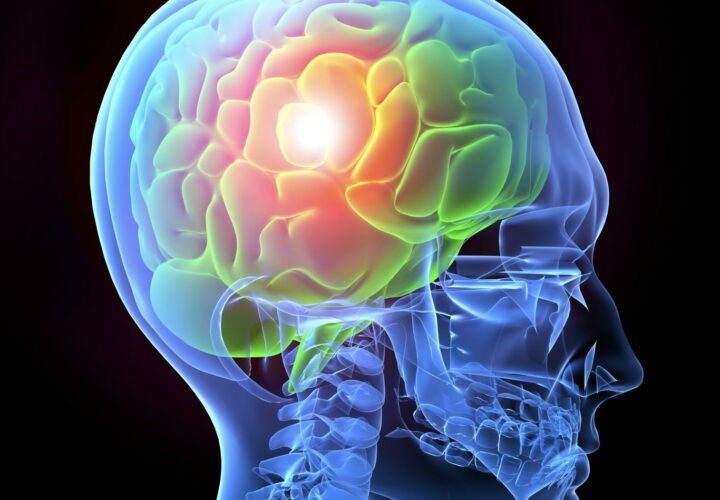Could the Keto Diet help with Alzheimer’s? Nutritionist Ed Blonz takes a closer look at the science behind ketogenic eating, brain health and dementia prevention.
Numerous studies, Healthline, AARP… Look around and you’ll find a flood of articles probing the possibility that the popular Keto Diet has brain health benefits — and even, possibly, the ability to help address Alzheimer’s and related dementias. The supposition is based in science: Some research indicates that Alzheimer’s may stem from trouble processing glucose, which is typically the brain’s preferred source of fuel. It is known that as we age, less glucose is able to cross the blood-brain barrier in order to fuel the brain. Researchers and brain health diet experts, like nutritionist Ed Blonz, know that ketogentic plays a role in that dynamic — and it could bring potential problems.
Addressing Alzheimer’s with a diet is tricky — firstly because the cause of the disease is still unknown, and secondly, because studying the link between diet and the disease’s symptoms or progression is a tall order. Like so much with Alzheimer’s, while we know certain foods are better for the brain than others, nothing is definitively proven about the relationship between what we eat and neurodegenerative disease.
All this considered, we wanted to take a closer look at the science behind this popular idea of taking up the keto diet for brain health or dementia prevention, so we sat down with Ed Blonz, Ph.D., a nutritionist and assistant clinical professor at the University of California, San Francisco who studies nutrition and brain health. Here are some of the takeaways from our 2018 conversation.
What is the Keto Diet?
You’ve maybe heard of the keto diet — a diet named for the fatty acid molecules in our bodies that fuel metabolism and support muscle function. It’s high in fats, low in carbs and moderate in protein. A ketogenic breakfast, for example, might involve mixing your coffee with coconut oil, heavy cream and butter, and scrambling eggs with cream cheese, with a side of smoked salmon for protein. All these fats force your body to make and rely on the ketones that the body makes when you aren’t taking in enough carbohydrates. Ketones come from the breakdown of fat when there are not enough carbohydrates to keep the blood glucose within normal limits.
What about the Keto Diet for Alzheimer’s?
While the keto diet can indeed provide a non-glucose source of energy for the brain, and ketones may have potential to affect the pathogenesis of Alzheimer’s disease, there are metabolic costs and nutrient sacrifices associated with this method. In other words, sticking to a ketogenic diet might provide your body with a needed alternate source of energy, but doing so could deprive the body and brain of many other essential nutrients that play a role in your overall vascular health—a key issue associated with the overall risk of Alzheimer’s disease.
The body treats ketones as a limited asset with associated risks. There are enzyme systems designed to prevent the blood level of ketones from getting too high. This can be a problem on a ketogenic diet, because the body cranks out a lot of ketones.
Ketones affect the pH (the acid-base balance) of the blood. We normally have a higher (less acid) pH, but ketones are acidic, and if present at elevated levels, they can lower blood pH, which can seriously mess with our metabolism. The condition called ketoacidosis, which occurs in out-of-control diabetes, can also occur in a poorly composed and monitored ketogenic diet, and this can be serious—even fatal.
On a biochemical level, using ketones as a source of energy for the brain does make some sense. In fact, the body relies on this alternative source of fuel when there is not food available—likely an evolutionary advantage for when the food supply is less stable.
However, a person does not need to adopt a ketogenic diet to produce ketones. In addition to messing with the body’s acid-base balance, carbohydrates get cut out of a keto diet, or down to a minimum, and this pushes many healthful foods–fruits and healthy grains—off the plate.
What the keto diet does for your heart
One of the accepted tenets in the battle against Alzheimer’s is that we need to focus on the health of the heart and vascular system to help prevent Alzheimer’s, or at least slow its progression. You’ve probably heard it before, but it’s true: What is good for the heart is good for the brain.
This what the MIND diet — a diet high in fruits and vegetables, fish and poultry, and olive oil — is all about. Preliminary studies have shown that adhering to the Mediterranean-based, heart- and brain-healthy diet may lower the risk of Alzheimer’s by as much as 53%.
If you opt, instead, for a ketogenic diet to provide ketones, you are thwarting the healthful eating element of the equation and missing out on a lot of nutrients. Relying on a ketogenic diet might provide some short-term benefits, but it would likely mess things up in the long run.
Using diet to lower your Alzheimer’s risk
With this as prologue, you can see why a ketogenic diet should not be the first approach to maintaining brain health.
According to Blonz, the primary focus must be to maintain vascular health by eating a healthy diet and exercising, doing everything in your power to reduce the incidence of health conditions associated with an increased risk of Alzheimer’s disease.
These are referred to as “co-morbidities,” include diabetes, insulin resistance, heart disease, obesity, and hypertension.
A high-fiber diet for brain health
A different approach, Blonz suggestions, could be to take a supplement of ketones (like beta-hydroxy butyrate) or fats that the body metabolizes into ketones. Caprilic acid, an eight-carbon fatty acid that makes up eight percent of the fats of coconut oil, is a fat that gets metabolized into a ketone after absorption. Another important piece of this approach is maintaining a high-fiber diet. Aside from being a boon to general health, fiber is often fermented in our gut into a type of fatty acid that gets turned into a ketone after absorption.
UPDATE: 00:01, February 3, 2023 — This article from April 2018 has been updated with new information to help our readers.






I do So wish that you would interview Max Lugavere on his work against Alzheimer’s.
A lot of this is misinformation. A slightly modified Keto has actually been shown to improve or slow Alzheimer’s issues. Alzheimer’s is being considered Type 3 diabetes. Clean, low carb, high HEALTHY fats, and low protein (too much causes an insulin response).
Look up Dr. Jason Fung a Nephrologist and author of “The Obesity Code” and “The Diabetes Code” He’s help MANY reverse diabetes, reverse or slow kidney disease, slow Alzheimer’s, help with ADHD, Autism, etc.
I have two sisters in thier early 60’s and one brother is his 50’s. All three have lost a lot of weight on the ketosis diet. All three are now complaining about memory loss and signs of dementia.
Sorry to hear that Brian. There are at least 3 types of Alzheimer’s, plus Vascular Dementia. Keto may improve symptoms in some types, but saturated fats cause other types. Whole Food Plant Based, no oil, supplemented with B12 and increasing vegetables (for Folate) to lower Homocysteine and drinking Fiji Water for silica are a few things, which genuinely could help. Look up the Adventist study and the Nun’s study. Vegan, low fat, diets are highly protective against Alzheimer’s as long as they supplement with B12 and eat enough plant foods with Folate. Most of the Blue Zones where there is longevity and cognitive soundness are near vegan (5% animal products or less) Dr. Barnard reverses Diabetes taking people off of fat and Dr. Ornish has reversed heart disease to the point of people not needing heart transplants with it. Whole Food Plant Based is what it is called. I am saying it because I have been reversing brain problems for the past year and a half. They need to manage glucose and Whole Food Plant Based does that in 2 weeks. They need to manage Homocysteine and Dr. Greger has a video on it. Vegans who supplement B12 and eat their vegetables have the lowest Homocysteine of anyone. They need to get the aluminum out of their diet and out of their products and out of their brain. Silica is how to get it out. Fiji Water for 12 weeks. 1 liter per day. They need to unblock their arteries by not eating saturated fats and refined carbs. If Keto preceeded the symptoms, it might be that they did plug up their arteries. Dr. Greger has a picture of how blocked the arteries of Alzheimer’s patients are. Turmeric can help. Blueberries and Kale. Foods with Lutein. Nuts can help and so can avocado. Each of those topics are Dr. Greger’s topics.
Interestingly, Women’s brains already run on Ketones no matter what their diet by that age and women get Alzheimer’s more than males do. Ketones aren’t protective. It is estrogen, before then, which was protective. If they had more kids and were pregnant longer, that is protective. Estrogen therapy at their age would make it worse. There are studies on that. They do need to unblock arteries – watch cholesterol, saturated fats and refined carbs (white flour) and sugars. The rest of carbs are not risk factors if the fats are low. Dr. Barnard has reversed Diabetes with a very high carb, low fat diet. It has an opposite mechanism of Keto, but actually heals the Pancreas in Type 2 Diabetes by getting the fat out of the pancreas. The blood sugar levels of people on Whole Food Plant Based no oil are lower than the people who are on Keto. There are documentaries: Forks Over Knives, Eating You Alive, PlantPureNation They reverse just about every disease and even improve eyesight.
Please provide the scientific research that shows that women’s brains run on ketones even while eating a high carb diet.
Can you please give me the links to the RCT’s this is based on? Thanks
Amouret, you can find this information through the US gov. Clinical Trials web site. ~ Thank you
The first question should be:
Can you please provide evidence that non-diabetics with “a poorly composed and monitored ketogenic diet” have suffered from ketoacidosis? How many have died?
That’s a good point. The fact is… They can’t provide such evidence because it doesn’t exist.
This talks about the unhealthy “dirty” keto. I have lost over 40 pounds, improved my math ability and my brain fog, got rid of the arthritis pain in my knees as well as my hands and never felt better. I eat 20 grams of carbs a day, mostly from leafy green vegetables, fish, poultry, and red meat in moderation, berries such as blueberries which are loaded with antioxidants and nuts. Avocado with olive oil and salt! Mmmmm! I have turned back the hands of time at 68! Also for the first time in my life I am not hungry all the time.
Rosey, Amazing post. Could you provide some links to articles or books for further study? What were the steps you followed? How long did it take to improve? Are there any other things you are doing that might contribute to your success treating the symptoms you listed? It sounds like you are basically doing a form of the Mediterranean diet, albeit with keto (low carb) spin. Your post matches my thoughts on how we should approach this. Take what we currently know (2019) to be a healthy diet, and modify it. See what improvements can be made.
John, check out the books by Dr. Jason Fung “The Obesity Code, The Diabetic Code”. Both books discuss ketosis, intermittent fasting/time restricted eating. He also addresses diabetes, obesity, neurodegenerative diseases and much more. He discusses where our country went wrong back in the 70’s with pushing low-fat and high carb diets as well. Also the book “Keto-tarian” by Dr. Will Cole is worth a read. These books can help answer many of the questions you have regarding a balanced, healthy diet with a bit of keto, carnivore and vegan.
I have also benefited tremendously from a ketogenic diet! Increased brain funcion is my FAVORITE! That’s no hype! An increase in BDNF – brain derived neurotophic factor – which is like miracle grow for the brain, is hightened in states of ketosis. I no longer have carb and sugar cravings! In addion, I have FAR MORE energy! (No more crashing and burnig!) We know that the keto diet is fabulous for brain issues! The brain will run on glucose FIRST, if glucose is present, but the brain LOVES KETONES!
This article seems very misleading.
Misinformation is correct. Only type 1 diabetics have to fear ketoacidosis. Ketoacidosis refers to diabetic ketoacidosis (DKA) and is a complication of type 1 diabetes mellitus. It’s a life-threatening condition resulting from dangerously high levels of ketones and blood sugar.
Definitely misinformation as you say, Brian. Ketoacidosis can only occur when both blood glucose and ketone levels are BOTH high.
this article simply lacks a body of evidence. Its claims are flawed and misleading, especially when many are struggling with health issues. The ketogenic diet is healthy, there are NO deficiencies, simply just follow the guidelines within the Banting framework and eat from the green list. Heaps of variety available.
Agree with you, Silvio. Too much fear mongering around the ketogenic diet. Plugging in ketoacidosis inappropriately is just wrong. This author needs to be better educated on the subject.
Okay let’s back things up, what did our ancestors live on for near to 2 million years? What did we evolve eating? Whole grains and vitamin B12 supplements, no I don’t think so. I’m following a clean keto/carnivore diet. I don’t eat sugar, grains or anything processed. Most of my food is local, doesn’t need to be shipped or flown around the globe. Better for health and the environment. I might add my mother has dementia, like her mother before her. Both followed a very “healthy” western diet. I’m going on evidence to change my outcome and I choose real natural carnivore food because that’s what I am.
There’s a flaw in your reasoning: the diet our early ancestors lived on was pretty much whatever they could get to survive, which might be extremely different from what we should eat for a long and healthy life. After all, evolution is ‘satisfied’ by a diet that ends up cranking out a lot of kids but dying shortly after they become independent.
and most native cultures around the world had far closer to perfect teeth it seems so they must have been been doing something right
You may wish to read the works of Weston A Price. He studied many “primitive” (ie natural living) cultures and found that they ate organically grown food, locally grown and therefore in season. They did not (of course) consume any processed foods. Of course there are other factors responsible for health such as exercise, lack of pollution, lack of stress. My body is on the other side of 75 and since going Keto and intermittent fasting no longer even suffer from colds, plus has increased energy and better sleep.
All your markers are better but they still say it will kill you! It is amazing how engrained the diet heart hypothesis is in mainstream medicine.
Loose weight well would like to do that but look at the Methionine loading eating meats, eggs, cheese and nits nuts etc Can lead to high Homocysteine level in plasma……. loose wight and also loose your brain to Alzheimer’s or Dementia……..choose wisely while you still have the capacity to do so!
Brian, there are a lot of factors in dementia. Studies show that chronic lack of sleep is the single biggest risk factor. If you don’t get your 8 hours of restful sleep a night, your brain suffers. Do your siblings get their sleep? Have they ever gotten their sleep? And while it is great that they have lost a lot of weight, that infers that they have been heavy for decades before that, and they probably did vascular damage from calcium deposits during that time. Just because their memory issues started now doesn’t mean keto did that. Most health issues are decades in the making, and their memory loss has been brewing for a long time and is just now coming to the surface.
I should add as a footnote that EVERYONE in their 50s and 60s is going to notice some loss of memory. That is entirely normal unfortunately.